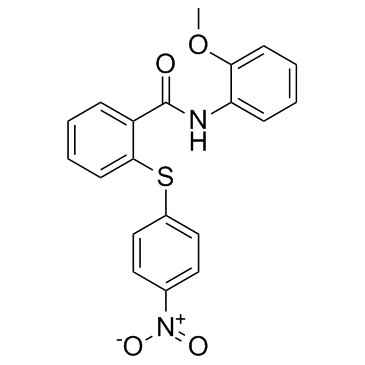| Description |
RN-18 is a HIV-1 viral infectivity factor (HIV-1 Vif) inhibitor with an IC50 of 6 μM in nonpermissive H9 cells.
|
| Related Catalog |
|
| Target |
IC50: 6 μM (nonpermissive H9 cell)[1]
|
| In Vitro |
RN-18 and RN-19 exhibits potent antiviral activity in the nonpermissive H9 and CEM cells but not in MT4 or CEM-SS cells, confirming that the antiviral activity was Vif specific. RN-18 shows the greater potency (IC50=4.5 μM in CEM cells) and specificity (IC50>100 μM in MT4 cells) among the two compounds[1]. In the presence of the inhibitor, RN-18, reverse transcriptase activity in the nonpermissive H9 and CEM cells decreases substantially and in a dose-dependent manner. RN-18 also exhibits antiviral activity in CEM-SS modified to stably express A3G but does not exhibit antiviral activity in the parental CEM-SS cell line. RN-18 antagonizes Vif function and inhibits HIV-1 replication only in the presence of A3G. RN-18 increases cellular A3G levels in a Vif-dependent manner and increases A3G incorporation into virions without inhibiting general proteasome-mediated protein degradation. RN-18 enhances Vif degradation only in the presence of A3G, reduces viral infectivity by increasing A3G incorporation into virions and enhances cytidine deamination of the viral genome[2].
|
| Cell Assay |
H9 or MT4 cells are treated overnight with 0, 1, 5, 10, 25 or 50 μM RN-18 (all at 0.1% DMSO) and infected with HIV-1. All cells are maintained in the presence of DMSO or RN-18 for 14 d, and viral replication is monitored every 2 d by measuring reverse transcriptase activity in culture supernatants. The average % relative infectivity at day 7 is determined from 3 separate reverse transcriptase assays. Grafit software is used to fit curves and to determine IC50[2].
|
| References |
[1]. Mohammed I, et al. SAR and Lead Optimization of an HIV-1 Vif-APOBEC3G Axis Inhibitor. ACS Med Chem Lett. 2012 Jun 14;3(6):465-469. [2]. Nathans R, et al. Small-molecule inhibition of HIV-1 Vif. Nat Biotechnol. 2008 Oct;26(10):1187-92.
|
